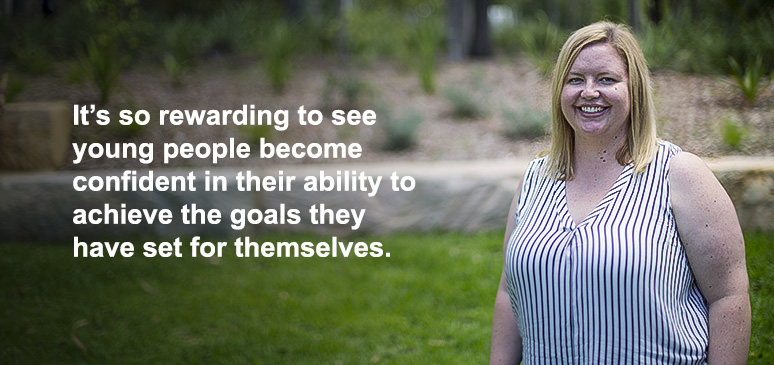Researcher Highlights
The fundamentals of caring
With almost ten years’ experience in the Out of Home Care (OOHC) sector, Emily Fuller is helping young people achieve success through education.

She has worked with various community services across New South Wales and Queensland, supporting children, young people, carers and staff in OOHC, which includes foster and residential care.
Emily joined the Centre of Excellence for Equity in Higher Education (CEEHE) as a Program Facilitator for Live, Learn, Grow (LLG) – a revolutionary program that supports first-year university students with an OOHC background to access and navigate university.
Her role has evolved to work with the wider OOHC community to provide services with information about higher education. She is also working with local agencies to enable young people in OOHC access learning opportunities outside the classroom through the Children’s University Newcastle program.
More recently, Emily has been appointed as the Acting Widening Participation Program Manager, overseeing the suite of widening participation programs supported by CEEHE.
Working to fill the gaps
While the Hunter and Central Coast regions are overrepresented in OOHC placements, very little research has been conducted around care leavers and there is an inconsistency with legislation between each state.
“Care leavers are not generally recognised as an equity group in higher education, despite this cohort often facing significant challenges that include financial difficulties, lack of social and family support as well as lack of stable accommodation,” Emily explained.
“The University of Newcastle (UON) and CEEHE are working to address this and are developing supported work in this area,” she said.
Partnering up
There is a growing willingness among the OOHC sector to engage in research regarding systems issues.
“Developing partnerships with local community groups is helping to establish effective research and support programs. In particular, LLG’s partnership with local agencies has significantly strengthened the program and its work, as well as helping us to provide more effective support to local children and young people," Emily said.
Agency engagement with the program is also encouraging carers and case workers to think about how they are talking and incorporating the importance of education into their work.
“I work with the wider OOHC community to provide information about higher education opportunities. We run on-campus events for high school students in OOHC to experience a university environment firsthand,” Emily said.
“I also talk to casework staff and carers about the pathways and support available to help young people access higher education so that they can better support children and young people in care. They are integral to the whole process, so we also arrange lectures and workshops at UON to provide learning opportunities for professionals involved in OOHC,” she added.
Writing a new chapter
In an effort to produce more research and evidence based practice, Emily is currently undertaking a Writing Programme offered by CEEHE.
“I am hoping to complete a research article detailing the work of LLG, particularly the importance of a facilitator role working with on-campus students,” she said.
“One of the best things about working in the equity space is seeing students, children and young people become excited and display increased confidence in their own ability to achieve goals they have set for themselves,” she added.
The University of Newcastle acknowledges the traditional custodians of the lands within our footprint areas: Awabakal, Darkinjung, Biripai, Worimi, Wonnarua, and Eora Nations. We also pay respect to the wisdom of our Elders past and present.